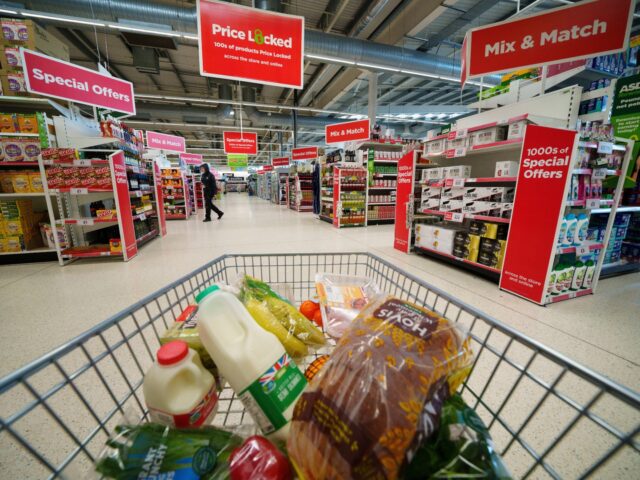Food prices in Britain have hit their highest level in nearly a half-century amid continued double-digit inflation, while wages fell yet again in real terms.
According to research conducted by the Office for National Statistics (ONS), the consumer prices index (CPI) remained in double digits at 10.1 per cent in March. The inflation rate — the highest in Western Europe — was slightly down from 10.4 per cent from the previous month, however, food prices remained high, hitting levels not seen in 45 years.
According to the government statistician agency, the prices of bread and cereals were up 19.4 per cent in the year to March, the highest rate recorded on record since the government began tracking such figures in 1989. Meanwhile, the sharpest price increases were recorded among food items produced with olive oil which were up by 49 per cent on the year, followed by milk products at 38 per cent, and ready-made meals, which were up 21 per cent over last year, the BBC reported.
The annual rates for chocolate, confectionery, and hot beverages also all hit their highest levels on record.
Annual inflation has slowed following a rise in Feb 2023:
▪️ Consumer Prices Index including owner occupiers’ housing costs (CPIH) rose by 8.9% in the 12 months to Mar 2023, down from 9.2% in Feb 2023
▪️ CPI rose by 10.1%, down from 10.4%➡ https://t.co/xKfB2k07mc pic.twitter.com/Ab0eVpqiiN
— Office for National Statistics (ONS) (@ONS) April 19, 2023
The persistently high inflation, which was expected to fall to 9.8 per cent, was still down from the previous month and lower than the 41-year high of 11.1 per cent recorded in October. The decline to 10.1 per cent was attributed to a decline in gas prices from last year when the Russian invasion of Ukraine saw global prices spike, however, household gas and electricity prices remained high for British consumers.
Commenting on the figures, ONS chief economist Grant Fitzner said: “The main drivers of the decline were motor fuel prices and heating oil costs, both of which fell after sharp rises at the same time last year.
“Clothing, furniture and household goods prices increased, but more slowly than a year ago. However, these were partially offset by the cost of food, which is still climbing steeply, with bread and cereal price inflation at a record high.
“The overall costs facing business have been largely stable since last summer, although prices remain high.”
Rishi Sunak Pledges to Cut Inflation and Stop Illegal Migrants… Eventuallyhttps://t.co/htllbtwalu
— Breitbart London (@BreitbartLondon) January 4, 2023
Meanwhile, Britons have been feeling the inflationary crunch in their paychecks as well, with the average worker being essentially poorer than they were last year, according to the National Institute for Economic and Social Research.
The report found that real wages, which are calculated by comparing earnings with inflation, had fallen by 3 per cent in real terms over the previous year. Wage growth stood at 6.6 per cent in the three months leading up to February, however, this lagged behind the increase in the cost of living, resulting in an effective pay cut.
Public sector workers were the most impacted by inflation, according to the think tank, with their wages declining by an average of 3.5 per cent in real terms, compared to private sector workers at 2.8 per cent.
Despite this, there has been little movement from the dubiously-named Conservative government of Prime Minister Rishi Sunak to reduce the tax load levied on the public, which currently stands at the highest level since the Second World War.
Indeed, the Chancellor of the Exchequer — the top man at the treasury — Jeremy Hunt took Wednesday’s figures as confirmation that the government should double down on its high tax agenda.
“These figures reaffirm exactly why we must continue with our efforts to drive down inflation so we can ease pressure on families and businesses,” the neo-liberal finance chief said.
High-Tax Tories: Fiscal Drag Agenda to Add Four Million People to Top Tax Bands, Cost Public £78bn https://t.co/UPYNiYm1qO
— Breitbart London (@BreitbartLondon) March 12, 2023
Follow Kurt Zindulka on Twitter here @KurtZindulka

COMMENTS
Please let us know if you're having issues with commenting.